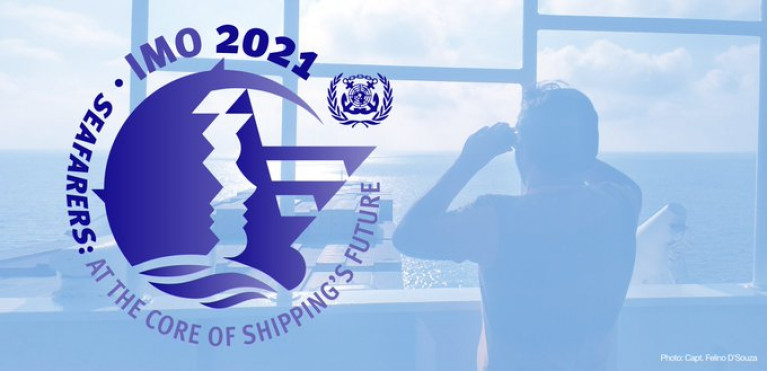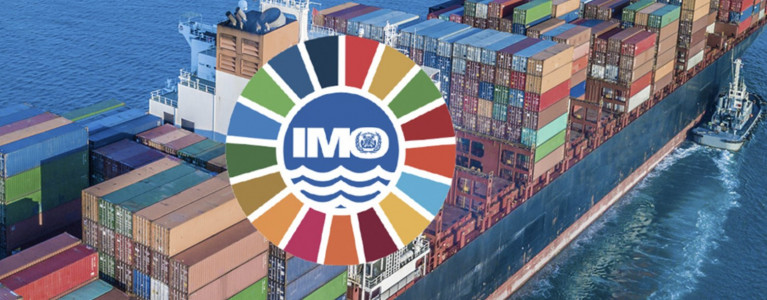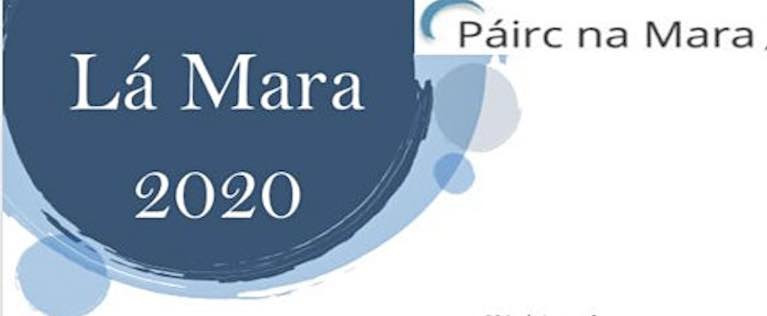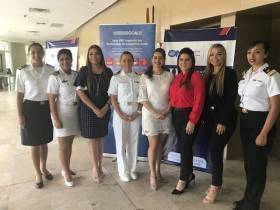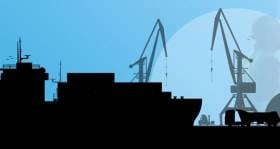Displaying items by tag: World Maritime Day
International Maritime Organization (IMO)’s Commitment to Preservation of Marine Environment on World Maritime Day 2023
This year sees the 50th anniversary of the adoption of the International Convention for the Prevention of Pollution from Ships (MARPOL), the primary global treaty for the prevention of pollution of the marine environment by ships from intentional, operational or accidental causes.
To mark the International Maritime Organization (IMO)'s dedication to the objectives of this landmark treaty, the theme of World Maritime Day 2023 is "MARPOL at 50 – Our commitment goes on". IMO is calling on Member States and all in the maritime industry to celebrate the day and be inspired to build upon the positive impacts MARPOL has brought. IMO's work towards a sustainable future with enhanced protection of our planet and ocean continues.
IMO-UNEP-Norway Innovation Forum
On World Maritime Day, the IMO-UNEP-Norway Innovation Forum 2023 (takes place today, 28 September at IMO Headquarters, London, and online). The Forum promotes innovation to accelerate the transition of the marine sector towards a zero- and low-emission future. Topics addressed through high-level panel discussions include: environmental performance; reducing plastic litter from ships; supporting innovation in marine fuel production; decarbonizing the maritime sector; unlocking green finance; and partnerships and collaboration.
Embracing the future by building on the past
In his message on the World Maritime Theme for 2023, the IMO Secretary-General, Kitack Lim, noted achievements already made in regulating to protect ocean health, but made it clear that significant work still faces the shipping industry:
"Shipping must embrace decarbonization, digitalization and innovative technology, including automation – while ensuring the human element is kept front and centre of the technological and green transition to ensure a sustainable planet for future generations. MARPOL has made a difference to shipping – and to the health of our ocean – and will continue to do so, as we look ahead to the next 50 years," Secretary-General Lim said.
Read the IMO Secretary-General's full message HERE, or watch the VIDEO
On World Maritime Day, the United Nations Secretary-General, António Guterres, called for "all-hands-on-deck" to realize a just and equitable transition to a greener, decarbonized shipping industry. Mr. Guterres said:
"Through the decades, MARPOL has made important contributions to protecting our planet and ocean by making shipping safer and cleaner. Looking ahead, let us build on the legacy of this convention and together steer towards a more sustainable and prosperous future for this critical industry – and a safer future for humanity."
Read the UN Secretary-General's message in full here.
MARPOL makes a difference
The theme, "MARPOL at 50 – Our commitment goes on", throws a spotlight on IMO's important regulatory work over half a century to protect the environment from the impact of shipping, and emphasizes the Organization's ongoing commitment to do more in support of the UN 2030 Agenda for Sustainable Development and the 17 Sustainable Development Goals (SDGs).
The downloadable graphics below detail the six Annexes contained in MARPOL and how they protect the marine environment.
Get involved in World Maritime Day 2023
IMO invites Member States and everyone in the maritime industry to celebrate the day on social media. Please use the hashtag #WorldMaritimeDay and tag @IMOHQ on X (formerly Twitter), Instagram, Facebook and LinkedIn).
After dark on 28 September, IMO's London Headquarters will be bathed in blue light to promote World Maritime Day 2023. IMO invites Member States, intergovernmental organizations in cooperation with IMO, and non-governmental organizations in consultative status with IMO to join them by lighting up their own landmarks.
Please send us pictures of your blue-illuminated local landmarks via our social media channels (see above) or email them to [email protected]. A selection will be included in this photo gallery.. Read more information here.
World Maritime Day Highlights "Seafarers: At the Core of Shipping’s Future"
Today is World Maritime Day and where the International Maritime Organisation (IMO) and the global maritime community come together to celebrate the annual event with a focus on this year's theme: "Seafarers: At the Core of Shipping's Future".
As part of the celebrations, which are a fixture in the global shipping calendar, four seafarers will join in an interactive webinar to discuss issues of importance to the future of the sector.
(Seafarers today will share their views during a webinar on World Maritime Day at 12:00 BST - join here: bit.ly/3AVorVw)
In addition, the IMO Headquarters in London will be one of several iconic landmarks to be illuminated in blue, kicking off an annual initiative to unite the maritime community and raise awareness of the vital contribution of shipping to the world. It will also draw attention to seafarers and their core role in shipping and its future.
"Shipping drives world trade and that trade simply does not happen without seafarers. While the challenges of automation and digitalization - not to mention decarbonization - will drive change in shipping, we will always need well-trained and motivated seafarers. We must ensure a diverse and expert workforce for the ships of the twenty-first century and beyond," said IMO Secretary-General Kitack Lim.
The 2021 theme was chosen as part of a year of action for seafarers, who play a vital role as key workers for global supply chains but are facing unprecedented hardship due to the COVID-19 pandemic.
During 2021, IMO has interviewed several seafarers about topics of importance to them and the future of the sector. The profiles (on the IMO website and social media channels (Twitter, Facebook, LinkedIn and Instagram) spotlight issues related to the human element of shipping, including the safety and security of life on board ships, seafarers' well-being, and the importance of ensuring an appropriately trained and qualified workforce, ready to meet the challenges and opportunities of digitalization and automation.
Interactive webinar
On World Maritime Day, seafarers Ayse Basak, Yrhen Balins, Marwa Elselehdar and Thomas Madsen will be the seafarer panelists during a webinar which will focus on issues such as crew change, diversity, safety, and the environment.
To join the webinar, please visit the World Maritime Day page.
Illuminating in blue
This year IMO will launch a new annual initiative to unite the maritime community and raise awareness of the vital contribution of shipping to the world by bathing the IMO building in blue light on World Maritime Day. The Memorial to Seafarers, which was inaugurated 20 years ago in 2001, will be lit up at sunset, along with the IMO emblem on the building. A video feed will be shared on social media. This symbolic effort, supported by the International Transport Workers' Federation (ITF), will be echoed around the globe with many maritime stakeholders joining in and sharing their images and videos on social media using the hashtag #WorldMaritimeDay.
Secretary-General Lim has invited IMO Member States, intergovernmental organizations and non-governmental organizations in consultative status to join in this annual initiative by lighting up their most iconic buildings, bridges, maritime ports, ships, monuments, museums and other landmarks on World Maritime Day each year.
Social Media
IMO welcomes participation in World Maritime Day events from stakeholders on social media, especially seafarers. Individuals and organizations are encouraged to share images on social media channels using the hashtag #WorldMaritimeDay. Photographs can also be sent to: [email protected] World maritime theme for 2022
'New technologies for greener shipping' has been chosen as the World Maritime theme for 2022, reflecting the need to support a green transition of the maritime sector into a sustainable future, while leaving no one behind.
Find out more
Click World Maritime Theme 2021 (imo.org) to read more about World Maritime Day 2021 and find the message from the Secretary-General, video and more.
Today is World Maritime Day 2020 – Sustainable Shipping for a Sustainable Planet
Today is World Maritime Day which the International Maritime Organisation (IMO) and the global maritime community have come together to celebrate the annual event. The 2020 theme is "Sustainable Shipping for a Sustainable Planet".
2020 saw everyone across the globe affected by the COVID-19 pandemic. Yet this global crisis has demonstrated the importance of shipping as the most reliable, efficient and cost-effective method of transporting goods internationally. Shipping remains the leading facilitator of the global economy, carrying more than 80% of global trade, said IMO Secretary-General Kitack Lim in his World Maritime Day message.
"Therefore, shipping and maritime will be at the heart of the economic recovery and future sustainable growth far into the future, both at sea and ashore, supporting an inclusive and resilient economy to underpin the achievement of the sustainable development goals. 'Sustainable Shipping for a Sustainable Planet', our theme for 2020 couldn't be more relevant now and for years to come," Secretary-General Lim said.
"In the post-COVID world, much focus will be directed at the 2030 Agenda for Sustainable Development and the 17 Sustainable Development Goals adopted by all UN Member States in 2015. These goals are as relevant as ever, and shipping is essential for sustainable development. The 2030 Agenda will only be realized with a sustainable transport sector supporting world trade and facilitating the global economy," Secretary-General Lim added.
The role of sustainable shipping for a sustainable planet will be highlighted during an IMO-hosted online event on 24 September.
At a separate event held on the margins of the UN General Assembly on World Maritime Day, Mr. Lim will highlight the important role of shipping and put a spotlight on the humanitarian crisis faced by seafarers who are stranded at sea due to travel restrictions imposed by governments to contain the spread of the virus. Mr. Lim will warn that seafarers should not be the collateral victims in this pandemic. He will underline that Governments must act in a coordinated manner to recognize seafarers as key workers, exempting them from travel restrictions, and implement the recommended framework of protocols for safe crew changes"
UN Secretary-General message on World Maritime Day
In a message issued on World Maritime Day, UN Secretary-General António Guterres said that "the theme of this year's World Maritime Day – 'Sustainable Shipping for a Sustainable Planet' – has gained extraordinary resonance as shipping has continued to transport more than 80 per cent of world trade, including vital medical supplies, food and other basic goods that are critical for the COVID-19 response and recovery."
Mr. Guterres reiterates his concern for seafarers stranded at sea and renews his appeal to Governments "to address their plight by formally designating seafarers and other marine personnel as "key workers", ensuring safe crew changes and implementing the protocols developed by UN agencies, as well as the International Chamber of Shipping and the International Transport Workers' Federation, allowing stranded seafarers to be repatriated and others to join ships."
A World Maritime Day IMO online event was hosted by IMO this morning which involved a high-level panel of speakers to debate "Sustainable Shipping for a Sustainable Planet". In additon a message by Kitack Lim, Secretary-General, IMO is available through this video link here.
World Maritime Day "Lá Mara" to be Marked by Udaras na Gaeltachta Marine Webinar
Ireland’s “blue economy” and the opportunities for Gaeltacht communities will be debated at a marine “webinar” hosted by State agency Udarás na Gaeltachta on Thursday to mark world maritime day.
Offshore renewable energy, standards for sustainable harvesting of both wild and farmed seaweed, and how to secure added value from same are among themes which will be discussed at the Lá Mara “webinar”.
A third-generation lobster fisherman and climate scientist will outline how community, culture, the coast and climate change have equal importance on the infamous islands of Maine, USA, in “crafting a roadmap for further developing Maine’s economy”.
Hosted by Údarás na Gaeltachta, Lá Mara is in its second year, following its first such event at Páirc na Mara in Cill Chiaráin, south Connemara, in 2019.
The State agency says that “uncertain times have brought into sharp focus the importance of the marine industry and its vital role for Irish and Gaeltacht communities”.
“The sustainability of vital natural resources that have sustained and nourished Irish communities deserve significant attention and innovation. Within one generation, life on the coast of Ireland has changed from not just nourishing a household but to one that can generate a decent living and a thriving and sustainable business,” it says.
The webinar will be held on Thursday, September 24th 2020 from 12.00 – 16.30 and those who wish to attend can register here
Celebration of World Maritime Day Also Supports Gender Equality & Empowering Women
Today is 'World Maritime Day' which is been celebrated by the International Maritime Organisation (IMO) and the global shipping community. The theme for this year's event is "Empowering Women in the Maritime Community".
This provides an opportunity to raise awareness of the importance of gender equality, in line with the United Nations' Sustainable Development Goals, and to highlight the important - yet under-utilized - contribution of women within the maritime sector.
"Gender equality has been recognized as one of the key platforms on which people can build a sustainable future. It is one of the 17 goals that underpin the UN's Sustainable Development Agenda, which countries all over the world have pledged to implement," said IMO Secretary-General Kitack Lim.
"Helping our Member States achieve the SDGs and deliver the 2030 Agenda is one of our key strategic directions. Gender equality and decent work for all are among those goals - SDGs 5 and 8- and, although we are highlighting the role of women in the maritime community this year, I want to stress that this is part of a continuing, long-term effort in support of these objectives," Mr. Lim said.
Empowering women fuels thriving economies across the world, spurs growth and development, and benefits everyone working in the global maritime community in the drive towards safe, secure, clean and sustainable shipping.
Watch the Turning the Tide video download and the World Maritime theme message from IMO Secretary-General Kitack Lim.
In addition for further information in turning the tide to bring gender diversity visit the Women In Maritime IMO's Gender Programme
‘Connecting Ships, Ports & People’ On World Maritime Day
#WorldMaritimeDay - ‘Connecting Ships, Ports and People’ is the theme of this year’s World Maritime Day on Thursday 28 September.
Discussing the place of the International Maritime Organization (IOM) in achieving the UN’s Sustainable Development Goals, IOM secretary-general Kitack Lim says ports have a significant role to play in generating “increased employment, prosperity and stability through promoting maritime trade.”
To this end, the IMO will help UN member states “to develop and implement maritime strategies that address a wide range of issues, including the facilitation of maritime transport, and increasing efficiency, navigational safety, protection of the marine environment, and maritime security.”
Lim adds that “to be sustainable, human activities have to be balanced with the oceans’ capacity to remain healthy and diverse in the long term.”
A parallel event for this year’s World Maritime Day, similar to last year’s forum, will be held in Panama this October.
World Maritime Day 2015: “Maritime Education & Training”
#WorldMaritimeDay - Today is World Maritime Day and the theme for 2015 is “Maritime education and training”.
World Maritime Day is been celebrated today at the International Maritime Organisation's (IMO) headquarters in London, but other events and activities focusing on maritime education and training will be held throughout the year.
The theme of "Maritime Education & Training" was adopted to focus attention on the wider spectrum of maritime education and training, in particular its adequacy and quality, as the bedrock of a safe and secure shipping industry. There is a need to preserve the quality, practical skills and competence of qualified human resources, in order to ensure its sustainability.
The 1978 STCW Convention and Code, as amended, set the international benchmark for the training and education of seafarers. While compliance with its standards is essential for serving on board ships, the skills and competence of seafarers, and indeed, the human element ashore, can only be adequately underpinned, updated and maintained through effective maritime education and training.
Symposium: "Shipping's future needs people: Is global maritime education and training on course?"
The Symposium is scheduled to take place today at IMO Headquarters. Speakers from the shipping and maritime industry and academia will address three sessions, covering:
Session 1: Opportunities for the young generation in the maritime industry
Session 2: Seafaring as a profession
Session 3: Developing seafarer skills through quality maritime education and training
IMO Secretary-General Koji Sekimizu will open and close the Symposium.
Member Governments, inter-governmental organization and non-governmental organizations in consultative status with IMO are invited to nominate delegates to attend the symposium.
Other events
Member Governments, the maritime industry and training centres are invited to organize their own events to support the theme today across the world.
UN Year of The Seafarer and World Maritime Day
To mark the occasion, the Secretary-General of IMO prepares a special message and this is backed up by a paper which discusses selected subjects in greater depth. The content of which is available on an audio MP3 file that can be downloaded by logging onto www.imo.org
The United Nations has designated 2010 as the UN Year of the Seafarer which incorporates World Maritime Day. The IMO will officially celebrate World Maritime Day at the organisation's London headquarters on the banks of the River Thames on Thursday, 23 September.



























